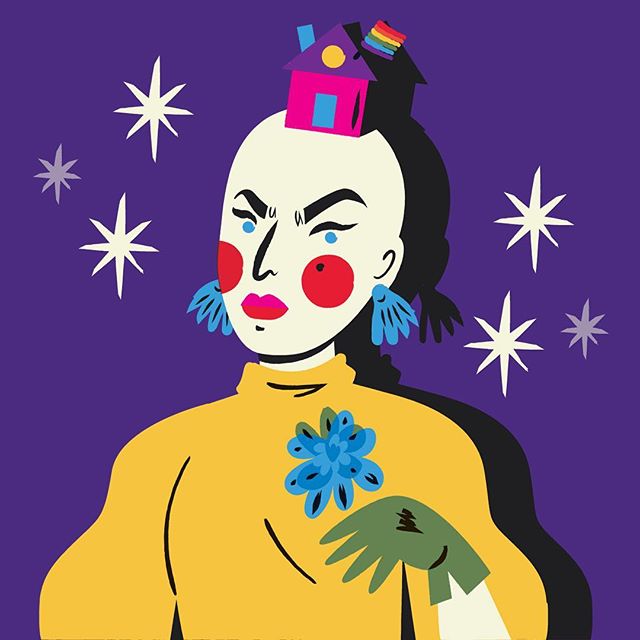Written by Anna Winterling.
Art by Bárbara Fonseca.
Growing up in the late 90s and early 2000s didn’t provide me with much exposure to teen dramas centered on anything but cis, straight romances. Even though I did have my childhood crushes on some of the male heartthrobs who made it to the cover of my TigerBeats, I was always equally as interested in their female counterparts.
To keep my parents in the dark I hung up my Leonardo DiCaprio posters and never really gave myself permission to acknowledge my attraction to women.
Unable to process what I was feeling, I began to imitate my girl crushes as a way of forming a connection all while trying to convince myself that I was longing to be like these girls instead of with them. My Wednesday Adams phase went on for way too long as I was coming to terms with how in love I was with Christina Ricci.
To keep my parents in the dark I hung up my Leonardo DiCaprio posters and never really gave myself permission to acknowledge my attraction to women. That is until I found what I considered to be a loophole.
What I learned about myself was when someone in a movie dressed as the opposite gender than they were initially presented, it turned me on. It felt safer for me to admit wanting to be with a girl if they were pretending to be a boy. Even after the inevitable reveal at the end when the female protagonist would go back to wearing makeup and exposing her tits to assert her heterosexuality, I realized I still wanted to be with them.
I was convinced that if I told myself I only thought she was hot because I was duped into thinking she was her brother then it was ok.
I was an avid Disney Channel Original Movie viewer and have a distinct memory of the first time I watched Motorcrossed, a true queer childhood classic. On a basic level this movie is about a girl named Andi who dresses as her twin brother to win a dirt bike race. The moment I realized I was a lot more attracted to Andi than the love interest in the movie was simultaneously confusing and very exciting. I was convinced that if I told myself I only thought she was hot because I was duped into thinking she was her brother then it was ok. In reality, I wanted Andi to take me on a date and teach me how to ride dirt bikes so we could make out when we went swimming to cool off (I wasn’t especially imaginative and this was the extent of my P.G preteen fantasy).
Other DCOMs depicted female camaraderie in a way that a blossoming queer like myself could attach themselves to. Cadet Kelly featured a tense frenemy relationship between Christy Carlson Romano and Hilary Duff that, if it had existed in anything other than the Disney universe, would have ended with the two in an opposites attract love match. As great as these imaginary pairing were, there was something about the girl pretending to be a boy trope that I kept coming back to.
This story approached gender identity in ways I had never experienced.
I love Motorcrossed and remember it fondly, but it became almost irrelevant when I watched the non-Disney movie Just One of the Guys. This story approached gender identity in ways I had never experienced. It followsTerry, played by Joyce Hyster, as she fights to be taken seriously as an aspiring journalist by her very predatory and sexist male teachers. In order to prove her point, Terry enrolls in a new school to pose as a male student. During the movie Terry is pursued by a girl, gets to take her female best friend to prom, and flashes the audience while wearing a tuxedo. It was perfect.
Despite my revelations I had a hard time breaking down what I was feeling. Did I want to be in a relationship with Terry? Did I want to be Terry? Did I just really like seeing tits? It really was a bit of everything and was the first time I questioned the all rules of gender and attraction I was taught.
After seeing Just One of the Guys I began staying up late to watch t.v by myself hoping to catch glimpses of any type of queer relationship. I watched But I’m a Cheerleader every time it came on at a low volume with the remote in my hand in case my mom came into the room. Even though I went into high school with my attraction towards women fully cemented I never had the courage to date a girl or even express interest. I was friends with many people at different points in the sexual preference spectrum, but I always explained away going to Pride parades or trips to the queer bookshops as just trying to support my friends.
Even though it wasn’t immediate, watching these movies during my formative years really helped me to develop my sexuality. Seeing Terry dressed in her tuxedo and taking her female friend to prom was incredibly impactful. The movie brought the exploration of gender identity and expression to my adolescent eyes. Working out my own orientation through these characters was essential to me finally being honest with myself about who I was attracted to and how much I wanted a hot girl dressed in a tuxedo to flash me.
About the Author
Anna is a Philadelphia-based writer and nurse who still watches DCOMs and is interested in making healthcare more accessible and inclusive.

